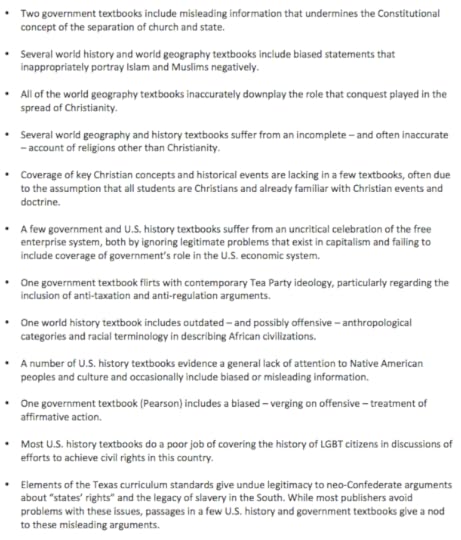Hemant Mehta's Blog, page 1870
November 20, 2014
Neil deGrasse Tyson’s Perfect Response to a First Grader Who Wants to Know How She Can Help the Earth
And the award for Most Adorable Interaction Between an Astrophysicist and a First Grader goes to these two:
It’s great advice: Play around, experiment, learn more about the world around you. As Neil deGrasse Tyson has said before, kids are born scientists. They’re naturally curious.
And they might remain that way, too, if it weren’t for those meddling adults!
BYU Expels Ex-Mormons Who Still Attend the School, but This Group is Looking to Change That
It makes sense that, if you attend a private religious school and lose your faith along the way, you shouldn’t go there anymore. It’s never that simple, though. What if your parents are paying your tuition because you go to that school? What if you’re in too deep with your major and transferring schools would mean starting from scratch? What if you still agree to follow the honor code and other rules? Should you be allowed to stay there?
The solution for most students would probably be, “I’ll keep my mouth shut and just play the Faith Game.” But a group called FreeBYU is asking administrators at Brigham Young University to refrain from expelling students who leave Mormonism while studying there:
Brad Levin, who is among three BYU graduates directing the effort, has seen Mormon students who suffered a “faith crisis” lose not only their standing in the Provo school, but also their university housing and campus jobs.
…
FreeBYU proposes that if students resign from the LDS Church, they be allowed to obtain an “ecclesiastical endorsement” from the BYU chaplain or their new religious leader and pay the non-LDS tuition to remain in school.
…
So, Levin argues, if Mormon students who join another church or become agnostic, yet agree to live by the honor code’s other standards (no drinking, smoking, coffee, tea or premarital sex) and are willing to pay the higher non-LDS tuition, they should be able to “continue their academic progress, retain their university employment and remain in BYU contract housing.“
What’s really great to see are current Mormons supporting FreeBYU. You can read their profiles here.
Unfortunately, school officials aren’t budging. Not yet.
BYU spokeswoman Carri Jenkins acknowledged that Mormons who change faiths are treated differently than those who enter as non-LDS.
“Nonmembers have not made promises and commitments that a member of the church has,” Jenkins says. “A former Mormon who decides to leave the church, distances themselves from those promises and commitments. The result is that they are not eligible to attend BYU.”
Jenkins seems to be ignoring the alternative: It’s not like those students will remain faithful Mormons if they’re threatened with expulsion. Rather, they’ll just become lying ex-Mormons, not telling people what they really think. In other words, the school’s inflexible honor code is forcing these students — who, to be clear, did nothing wrong — to lie for the sake of finishing their education.
BYU has every right to say to students, “If you’re not a Mormon, you can’t be here.” The problem here isn’t a legal one. It’s a moral one (and maybe even a strategic one): Do they want students to be honest? With the current policy, that’s not happening. And it sure as hell isn’t giving those students any reason to reconsider Mormonism.
Congressional Hearing on “Religious Accommodations” in the Military Gets Contentious
Yesterday, the U.S. House Armed Services Committee held a hearing on “Religious Accommodations in the Armed Services” — and Mikey Weinstein of the Military Religious Freedom Foundation was one of the non-right-wing representatives on the panel.
You can now watch the hearing online. Weinstein begins speaking at the 25:18 mark, and his prepared remarks are here:
Weinstein drew a good chunk of attention every time he spoke, though nothing he said seemed to be all that controversial. (Listen up around the 46:30 mark to hear Congressman Walter Jones (R-NC) comment about how the “end of the world” will come if we enforce religious neutrality on military leaders.)
If any other moments stand out to you, please leave the timestamp and summary in the comments!
Why is Richard Dawkins Doubling Down on His Previous Statements?
By now, you’ve no doubt read the interview with Jaden and Willow Smith. The kids, born into wealth to famous parents, gave laugh-out-loud answers to the New York Times and clearly thought they were way more intelligent than they actually sounded. Instead of coming across as above it all, it’s clear they’re not even in the same realm as the rest of us:
You mentioned breathing earlier, and it’s also an idea that recurs in your songs.
WILLOW: Breathing is meditation; life is a meditation. You have to breathe in order to live, so breathing is how you get in touch with the sacred space of your heart.
JADEN: When babies are born, their soft spots bump: It has, like, a heartbeat in it. That’s because energy is coming through their body, up and down.
WILLOW: Prana energy.
JADEN: It’s prana energy because they still breathe through their stomach. They remember. Babies remember.
WILLOW: When they’re in the stomach, they’re so aware, putting all their bones together, putting all their ligaments together. But they’re shocked by this harsh world.
JADEN: By the chemicals and things, and then slowly…
WILLOW: As they grow up, they start losing.
JADEN: You know, they become just like us.
They’re 14 and 16 and they sound like they just graduated from the Deepak Chopra School of Bullshit. (Or a place that preaches Scientology…)
I bring this up because it reminded me of Richard Dawkins.
In an interview with reporter Kimberly Winston, Dawkins stood by the really frustrating and tone-deaf remarks he’s made over the past year on Twitter (and even before that, in other venues). It was pretty obvious from his remarks that none of the criticism leveraged at him has sunk in. And those of us who still appreciate his books — count me in that mix — are left trying to figure out what the hell to make of all this.
The biggest question I’m trying to sort out is how someone I consider brilliant could be so callous and indifferent in the way he handles some very sensitive issues.
Part of the answer, I think, is that Dawkins, just like Jaden and Willow, has lived in a completely different world from the rest of us for so long. He’s been a global celebrity for most of his life. For the past few decades, just about everyone who’s ever approached him has asked him questions about issues like evolution and religion and science — not privilege and feminism and sexual abuse. As a Dawkins fan, I wish he was as eloquent on those latter issues as he is on the former, but maybe that’s too much to expect. Just because he’s an expert in some areas doesn’t make him an expert in everything. But that hasn’t stopped him from offering his opinion, anyway. That’s the problem. He thinks he speaks for all rational people on those subjects… and that makes the people who disagree with him (in his mind) automatically irrational.
What really hurts his image (and bothers many of us) is that he doesn’t understand how his statements, which I’m sure seem perfectly logical to him, may come across to people who have different experiences. Sure, some of his comments have been blown wildly out of proportion — as is always the case when a celebrity says something regrettable — but he’s not without fault. He just lives in a bubble and doesn’t realize it. He’s the Jaden Smith of the atheist world.
I also think he’s used to more formal debates where, if you disagree with someone, you respond with a calm rebuttal. Turns out the online world doesn’t work that way. So all he sees are vilifications of his character — the same tactics used by his lifelong opponents — and that just convinces him that he’s been right all along. No wonder he doubled down on his statements. It’s a lot easier to change your mind privately, where you’re not subject to humiliation and being portrayed as the bad guy. When you’re attacked publicly, as is usually the case with him, you become more defensive.
I can tell you that if I were criticized in the way I’ve seen Dawkins criticized — with flippant sarcasm, or over-the-top outrage, or having my own words twisted in a way I never intended — I probably wouldn’t change my mind, either. I’d just get angry at the people who refuse to give me the benefit of the doubt and who seem hell-bent on discrediting me. That’s not to say the critics aren’t justified (or right), but that it just wouldn’t be an effective way to get through to me. There’s an art to telling people they’re wrong in a way that’ll get through to them — I know some teachers who are experts at it — and the Internet is where that skill goes to die.
I want to make clear that I don’t think his critics should stay silent. If Dawkins is wrong, then by all means, they should push back. Some of the things he’s said has made me cringe, and I consider myself pretty immune to being offended. But I wonder whether the critics actually want to change his mind rather than just appease their reading audiences, because if they did, they might try a different approach. Part of the reason Dawkins’ defenses are up is that he really does believe he’s on the right side of these issues and the people who are supposed to support him don’t seem to give a damn about that.
Maybe this is a bad analogy, but I’m sure he sees this as synonymous with vegans getting really mad at a vocal vegetarian on the subject of animal rights. The vegetarian is thinking: We’re supposed to be allies! Shouldn’t we be working together against the real enemy?!
What’s the solution, then? The simple one would be to have someone Dawkins trusts sit him down privately and explain why his statements rub some people the wrong way and why he ought to be more thoughtful when he talks about these subjects (or convince him to just keep his mouth shut in these situations). I don’t know if he has anyone like that in his life — who feels that way and whom he respects.
Maybe that wouldn’t be enough, though. I mean, I’ve had several conversations with close friends about these controversial topics, and I still (inadvertently) slip up. That said, I think it’d be a good start. But that also means none of us — who don’t know the guy in real life and who can only attempt to communicate with him impersonally (and therefore ineffectively) over the Internet — are going to change his mind anytime soon.
(Image via Albert H. Teich / Shutterstock.com)
Texas Board of Education Delays Vote to Approve Textbooks Full of Revisionist History
You may recall that the Texas State Board of Education was considering the adoption of revisionist history textbooks that might as well have been written by Christian pseudohistorian David Barton.
The Texas Freedom Network commissioned a review of the books and you can read their report right here:
Among the problems:
A number of government and world history textbooks exaggerate Judeo-Christian influence on the nation’s founding and Western political tradition.
…
Several world geography and history textbooks suffer from an incomplete — and often inaccurate — account of religions other than Christianity.
…
One world history textbook includes outdated — and possibly offensive — anthropological categories and racial terminology in describing African civilizations.
…
One government textbook (Pearson) includes a biased — verging on offensive — treatment of affirmative action.
Disturbing to say the least.
But in a surprising turn of events, on Tuesday, the Board of Education delayed approval of the new history textbooks in a preliminary vote.
According to Reuters, the board, comprised of 10 Republicans and 5 Democrats, has asked publishers to make changes critics have demanded. Still, the board wasn’t able to get preliminary approval of the books, setting them up for a high stakes final vote Friday, when the board will approve the books or else miss the deadline to get them to the state’s 1,000-plus school districts by September 2015.
In fact, the five Democrats voted against approval, five Republicans voted for approval, four more Republicans abstained from the vote, and one wasn’t there.
There’s still a chance the Republican members could change their minds by Friday when the final vote takes place. If they do, they’d only make life tougher for the students in the state, who won’t be getting the education that other high-schoolers around the country are receiving. And since Texas’ textbooks are often adopted by other states, the miseducation would spread far beyond those borders.
(Thanks to Brian for the link)
There’s a Creationist Vending Machine in a Massachusetts Mall
Reader Brian was visiting the Holyoke Mall in Massachusetts when he came across the strangest vending machine you’ll ever see…
It was selling books about Creationism written by Ken Ham:
Those books include The Great Dinosaur Mystery Solved and Demolishing Supposed Bible Contradictions.
Brian says the price for the items is between $12-$14 each. But even if they were giving them away, it’d be too damn much.
And check out that slogan at the bottom of the machine: “Get your answers now!”
So here’s a simple question: What would be a better slogan for this vending machine? Let us know in the comments. As an extra incentive, I’ll be giving away a free shirt courtesy of Reasonist Products (you’ll get to pick which one, though an example is below):
If you’d like the chance to win a shirt, just leave the hashtag #WorstVendingMachineEver at the end of your comment and I’ll select a random winner next week!
Selfies for Salvation
John Crist explains all those pictures I never see because I don’t follow Christian girls on Instagram (or anyone on Instagram, for that matter):
Someone please make an atheist version of this? #DecafWithDillahunty
(via Stuff Christians Like)
November 19, 2014
New Zealand Parliament to Vote on Updating, but Not Eliminating, Daily Prayer
If your local government is considering some changes to its traditions regarding public prayer, it might be worth your time to consider what’s happening in New Zealand’s national Parliament (below) right now. Speaker David Carter has proposed a change to the prayer being used to open each working day and hopes to bring it before his fellows for a vote.
The current prayer, adopted as part of the daily routine in 1962, references “Almighty God” and “Jesus Christ our Lord.” The prayer goes on to ask the aforementioned deity to grant “that we may conduct the affairs of this House and of our country to the glory of Thy holy name,” and it calls for “the maintenance of true religion and justice.” It ends with an old-fashioned Biblical “Amen.”
One might imagine that New Zealanders of a non-Christian faith (or none at all) might not feel particularly included in this particular facet of government proceedings.
That’s particularly relevant in a country where the 2006 census showed that only 55% of the population identified as Christians (including the Maori Christian population). Those numbers represented a slight decline from the prior census, five years earlier. Most of those people appear to have shifted into the “No Religion” category, which showed a corresponding increase in size. Census numbers also reveal increasing Hindu, Muslim, Buddhist, and Sikh populations in New Zealand, which demographers mostly attributed to immigration.
The proposed new prayer is bilingual — English and Maori — and makes reference to Indigenous beliefs and traditions throughout its opening paragraph. The prayer invokes broadly-accepted secular values, including “the maintenance of justice, the honour of the Queen, and the public welfare, peace, and tranquility of New Zealand.” Some of these values were highlighted in the 1962 prayer as well, but the new version cuts out explicitly religious values (like “the maintenance of true religion”) and subtly shifts emphasis to place responsibility for those values on individual human choices, rather than the intervention of a deity.
Not all religious references, though, are scrubbed from the updated prayer; the opening still addresses “Almighty God,” albeit in Maori (“E te Atua Kaha Rawa”). Participants are asked to “acknowledge the need for guidance,” but they needn’t affirm that such guidance ought to come from a deity. The prayer closes with the word “Amine,” the Maori translation of “Amen.”
If online comments from the readers of Stuff.co.nz are any indication, the changes don’t go far enough. Many are saying that they see no need for official prayer at all in a secular democracy. Members of Parliament, however, are being asked to choose between the old prayer — references to Lord Jesus and all — and the new one, with no amendments allowed. There is no option to put an end to parliamentary prayer as a whole, whatever the voting public might think about it.
This more inclusive, more secular affirmation is a better way to start the parliamentary day. But it seems that the people of New Zealand — especially the non-Christian half, or the 34% with no religious beliefs at all — still have quite a long way to go before they can truly say their government represents their wishes on the subject.
(Image via Shutterstock)
San Francisco Photographers Close Their Business Rather Than Serve a Same-Sex Couple
Another business has closed up shop rather than serve a gay couple.
When asked to photograph two men for their wedding, Bay Area-based urloved Photography (ironic name, no?) referred the couple to another photographer because of their clashing beliefs. The owners, Nang and Chris Mai, released a statement on their website explaining their version of what happened:
Urloved photography, a San Rafael husband-and-wife team, said it had recently referred a San Francisco gay couple to another photographer for their wedding photos because they “have different personal beliefs that we have difficulty with.”
“We genuinely felt referring this couple to a photographer who does share their personal beliefs would provide them with the best service for their special day,” a statement on urlovedphotography.com reads.
Similar incidents have popped up all over the country, prompting an onslaught of conversation about religious freedom, free speech, and where private businesses fit in (and legislation to match). Denial of services on the basis of sexual orientation is illegal under California law:
California’s Unruh Civil Rights Act, which provides protection against discrimination based on sexual orientation, states that “all persons are entitled to full and equal accommodations, advantages, facilities, privileges, or services in all business establishments, including both private and public entities.”
As is often the way when businesses pull this kind of stunt, the company’s Facebook and Yelp pages were flooded with negative reviews and hate mail — so much that the couple asked their supporters to leave the business owners alone. The Mais apologized to the men and later announced they were closing their business.
“Unfortunately, our artistic passion for excellence and personal beliefs were misinterpreted. That was never our intent. We have been flooded with hate calls, e-mails and accusations that inaccurately depict our business,” the couple wrote. “On top of that we have come to a difficult decision that we will no longer be in the wedding photography business.” …
“(We) consider this issue resolved and would urge you to stop posting on their FB page, Yelp, and any other social media site,” one of the men wrote on Nov. 7 on Facebook. “Our friends, family, and the LGBT community/allies have all been amazingly supportive and active in helping to bring this matter to light. We must respect that Nang and Chris have decide to shut down their business because of their beliefs. I wish the outcome could have been different but it is what it is.”
Considering they’re a wedding business based in San Francisco, I don’t know how these people could have imagined any outcome besides outrage. Nobody forced them to shut their doors; they brought this on themselves.
Louisiana High School’s Veterans Day Assembly Included Christian Prayer
On Veterans Day last week, students at Morgan City High School in Louisiana attended an hour-long assembly which began with a Christian prayer. Furthermore, they were told to stand up and bow their heads. Now, the American Humanist Association’s Appignani Humanist Legal Center is asking for an apology on behalf of a student who contacted them:
Attendance at the assembly was required and the students were not given prior notice that a prayer would be included as part of the assembly. The student in question felt compelled to stay at the assembly despite her sincere objection to school-sponsored prayers, because she feared the school would punish her if she attempted to leave. (Apparently, teachers have punished students in the past for exercising their constitutional right to sit out the Pledge of Allegiance.) The purpose of this letter is to advise you that this practice of including prayer in school-sponsored events must immediately cease, and that our organization will pursue the matter through litigation in federal court if it does not. We specifically demand assurances from the school district that prayer will no longer be included in such school-sponsored events in the future.
The AHA is giving the district one week to respond. It’s really amazing, though not surprising, that someone gave a green light to a religious ceremony. As if it never crossed anyone’s mind that not all the students are Christian. This should be a simple, straightforward apology followed by a promise never to do it again, but if it’s anything different, I’ll post an update.
(Image via Shutterstock)
Hemant Mehta's Blog
- Hemant Mehta's profile
- 38 followers















